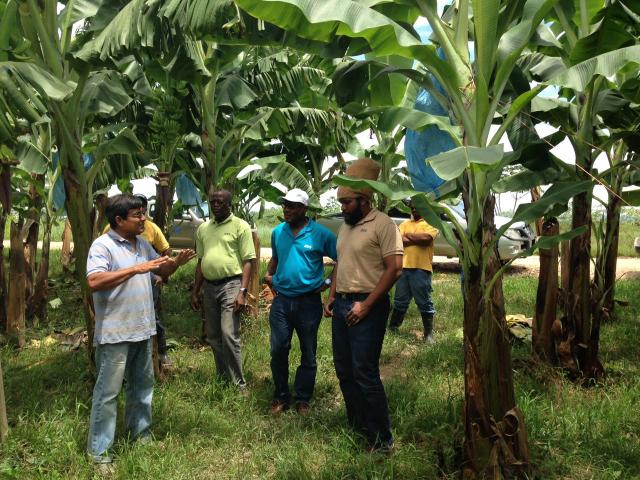IICA staff mission from several country delegations (Costa Rica, Grenada, Haiti, Suriname, Trinidad and Tobago) prepare a project proposal to increase banana productivity by increasing soil fertility and using improved planting material.

Following a request from the Ministry of Economic Development, Petroleum, Investment, Trade and Commerce, within the context of the Banana Accompanying Measures (BAM) 2013 program to provide financial assistance from the European Union (EU) to the Belize banana sector, more specifically the Banana Growers Association (BGA), a IICA staff mission from several country delegations (Costa Rica, Grenada, Haiti, Suriname, Trinidad and Tobago) prepared a project proposal to increase banana productivity by increasing soil fertility and using improved planting material.
In this project proposal, Integrated Soil Fertility Management (ISFM), which refers to the systematic, efficient and effective use of mineral fertilizer, organic inputs and improved germplasm combined with good agronomic practices, such as fallowing and cover crops and soil drainage (Fairhurst, 2012) will be used as a more holistic and sustainable approach to improve soil fertility/health, maximise agronomic use efficiency and crop productivity. ISFM strategies will focus on the building soil nutrient and microbial capital by better managing available organic resources and increasing nutrient use efficiency via agronomic practices and the use of improved and/or available germplasm. Increased water use efficiency is often an additional benefit of ISFM.
The overall objective of the project is to foster social and economic development leading to the reduction of poverty, focusing on workers, their families and communities in the banana belt area of Belize.
The main results of the project are to increase resource efficiency of the banana industry, increased knowledge capacities of farmers and the Banana Growers Association (BGA) for Integrated Soil Fertility Management (ISFM) and enhanced capacity of the University of Belize micropropagation laboratory and nursery facilities for production of improved planting material and soil diagnosis services.
More information:











